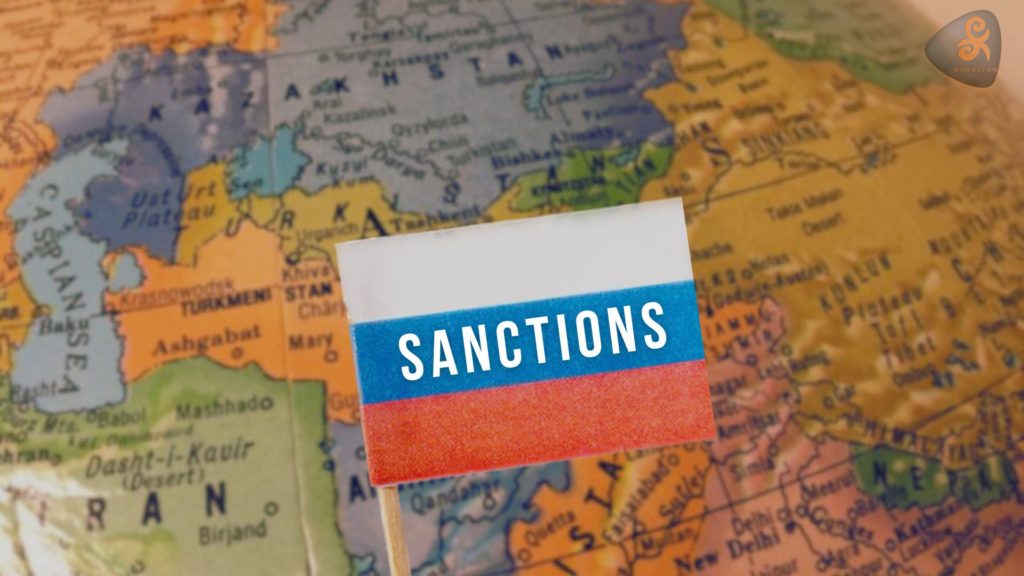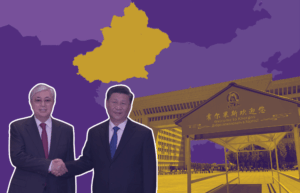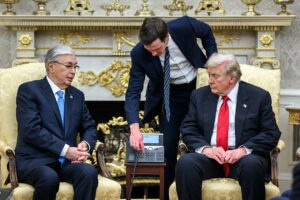Since the beginning of the Russian invasion of Ukraine, the U.S., the EU, and other countries have imposed massive sanctions against Russia. They range from financial and economic (such as removing Russia from the international SWIFT-System and banning the import of oil and gas) to personal sanctions against Russian oligarchs. However, some find a way around the direct import bans – and Central Asian countries have become integral components of such evasion schemes. The consequences are yet to be faced.
Sanctions against the Kyrgyz companies
The US Department of Commerce has blacklisted 69 Russian companies, including one from Kyrgyzstan and one from Armenia.
“We will continue to impose costs on the Kremlin for continuing this war both by further restricting their access to additional items, as well as through aggressive enforcement,” reports Reuter.
According to information disclosed in the Federal Register of the United States, the Kyrgyz company is identified as Tro. Ya, with its headquarters located in Tokmok, Kyrgyzstan. Listed as a Legal Consulting Company on the official website of the Kyrgyzstan Ministry of Justice, Tro.Ya is noteworthy due to its director, Hilo Naser, also being the owner of Nas.Tech is a company registered at the same address. Records indicate that Tro.Ya is associated with Nas.Tech, further highlighting their interconnectedness.
There are no official statements from the Kyrgyz authorities regarding the Western sanctions. The fallout for the Kyrgyz company remains uncertain. Still, the U.S. resolute move is a stark reminder that associating with Russia’s military endeavors invites severe consequences, including international sanctions and restricted resource access.
Russian companies circumvent sanctions and increase trade relationship with Kazakhstan
Kazakhstan’s import-export value significantly increased to Russia.
Despite Western sanctions, Russia continues to import cutting-edge technology from friendly countries, including drones, microchips, and microelectronics. “Important Stories”, OCCRP and Der Spiegel published an investigative article on how Russia dodges the sanctions.
Russian companies specializing in military equipment are unable to officially import goods – but with the help of side companies registered abroad, the ban seems to be easily evaded.
For example, Kazakhstani company Aspan Arba became the official distributor of DJI in Kazakhstan in November 2022. “Aspan Arba” obtained a license to import 18,000 DJI drones worth $45 million, and 500 drones were sent to “Nebesnaya Mekhanika” in Russia. The exporter is DJI Europe B.V., the Dutch subsidiary of a Chinese company.
Kazakhstan’s “Aspan Arba” was founded in April 2022 by the same person who founded “Nebesnaya Mekhanika” – Ilya Gorberg, – and the current director of “Aspan Arba,”, Mikhail Sapozhnikov, was a co-owner of “Nebesnaya Mekhanika” with Gorberg.
Another company, “Elix-st”, registered under the names of Evgeny and Elena Cherneta in Europe, owns the company “Elix-M” in Russia. The company specializes in the development of materials for absorbing electromagnetic waves, which are used, among other things, for radar camouflage (including military equipment), and primarily serves Russian defense enterprises.
In March 2022, a company “Da Group 22” was registered in Astana, Kazakhstan, listing Alexander Cherneta (presumably the son of Evgeny Cherneta) as owner and manager. It is worth noting that between 2018 and 2021, before the war, “Elix-st” did not import any goods into Kazakhstan (while exporting to Russia, conversely).
“Nebesnaya Mekhanika” and “Elix-st” are not the only examples. There are numerous other companies listed in the OCCRP investigation with similar narratives, importing military equipment from Western countries and channeling them through Kazakhstan. The scheme itself is quite intricate and convoluted.
Trade volume is growing
OCCRP mentions that, according to the Office for National Statistics, the import of microelectronics into Kazakhstan more than doubled since the Russian invasion. In 2021, integrated circuits worth $35 million were imported, similar to previous years. Yet, the import value surged to over $75 million in 2022. On the other hand, microchip exports from Kazakhstan to Russia were negligible, totaling $245,000 in 2021 but increasing to $18 million in 2022. Drones were not mentioned in Kazakhstan’s 2021 import-export report, but the OCCRP investigation states that in 2022, Kazakhstan imported drones worth $5 million and exported drones valued at $1.23 million to Russia.
During a press conference in February, former Minister of Foreign Affairs of Kazakhstan, Mukhtar Tleuberdi, expressed that Kazakhstan is striving to prevent any potential sanctions evasion by Russia. However, he acknowledged the challenges posed by the fact that both Kazakhstan and Russia are members of the Eurasian Economic Union, which exempts trade between them from customs control.
Read more on Novastan: Effects of Sanctions on Russia strongly felt in Dushanbe
The trade data from Kazakhstan strongly indicates that the country is being utilized as an intermediary destination for the import of drones into Russia. This highlights the complex dynamics at play in the region’s trade relationships.
Kazakh authorities provide contradictory statements concerning their trade partnership with Russia
Despite assurances from the Kazakhstani authorities regarding compliance with Western sanctions, President Kassym-Jomart Tokayev emphasized in an interview with a Russian television channel that Kazakhstan is by no means abandoning its alliance obligations.
“Emphasizing our continued collaboration with the Russian government, I would say that we are working at an accelerated pace and achieving necessary agreements without violating the sanctions. There are complex issues that require time to understand how to resolve specific situations, but once again, we find solutions to these matters. The situation is unique. No one could have expected us to live in this particular reality. However, it exists, and therefore, we must address these issues that arise from this reality,” concluded the Head of State.
Read more on Novastan: Kazakhstan’s gradual divorce from Russia
In April, following the visit of high-ranking Western officials responsible for sanctions to Astana, information emerged that Kazakhstan intends to monitor the movement of goods from border to border in real time and establish a system to track violations of sanctions. Moreover, on 20th of June, deputy foreign minister Almas Aidarov stated at the briefing at the central communications service that Kazakhstan prohibited the supply of military goods to Russia.
“<…>Regarding sanctioned goods and the latest package of sanctions, where Kyrgyzstan was also included, as of last year, we have completely banned the supply of military-purpose goods to Russia. For dual-use goods, a special certification has been introduced, meaning a special license is required, along with obtaining permission for export.”, – stated Aidarov.
For more news and analysis from Central Asia, follow us on Twitter, Facebook, Telegram, Linkedin or Instagram.
 Russia continues importing military equipment despite Western sanctions
Russia continues importing military equipment despite Western sanctions 



